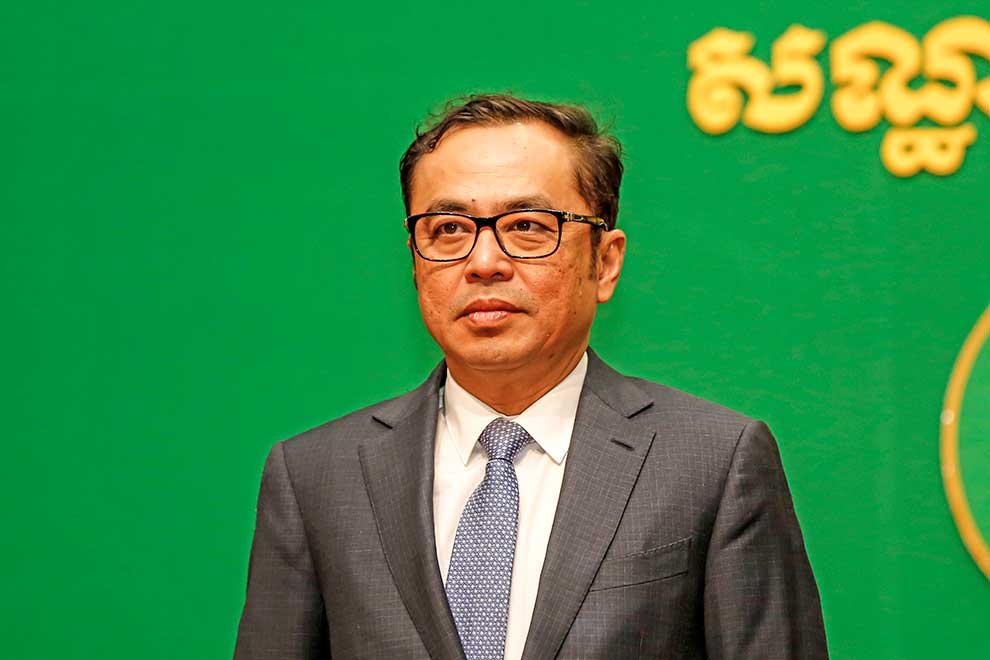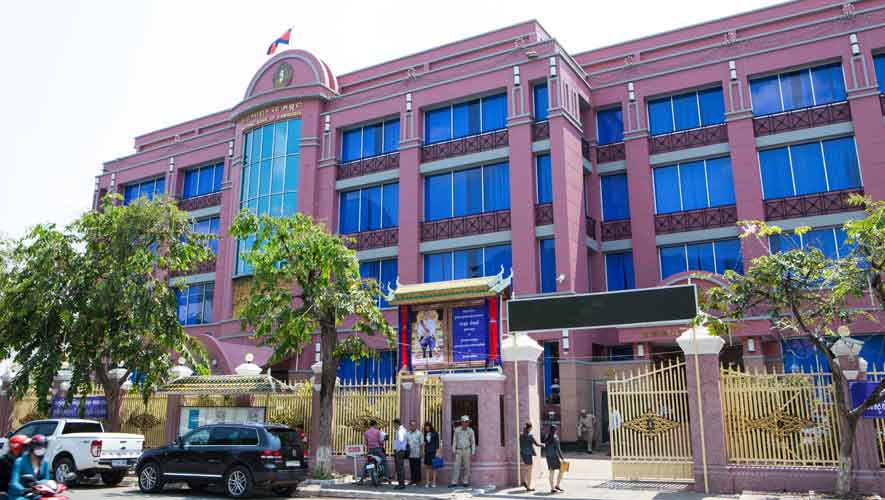The permanent secretary of state at the Ministry of Economy and Finance (MEF) sits down exclusively with Capital Cambodia to discuss the policy implementation, maintaining economic stability and the importance of institutional co-operation between the MEF and the National Bank of Cambodia.
For the latest Cambodian Business news, visit Khmer Times Business
Q: What is the level of cooperation and collaboration between the MEF and the National Bank of Cambodia (NBC)with regards to fiscal policies, debt levels and interest rates?
Vongsey Vissoth: The MEF and the NBC enjoy close cooperation and collaboration at both the technical and managerial levels, focusing on the following key aspects.
A common goal and objective – both the MEF and the NBC are working towards one goal that is to ensure macroeconomic stability and promote economic growth. The MEF is responsible for the government’s overall macroeconomic policy and also formulating – as well as implementing – the fiscal policy through allocating government spending, collecting tax revenue and managing debt levels.
While the NBC is in charge of monetary policy – as a monetary authority, it uses monetary policy through managing money supply and exchange rates to control inflation. The NBC plays an important role in ensuring financial stability, providing an environment conducive to doing business by ensuring price stability. In short, the two play complementary roles to achieve one common goal and other development objectives set out in the Rectangular Strategy of the Royal Government of Cambodia (RGC).
However, it should be noted that in the case of highly dollarised economy such as Cambodia, monetary policy plays only a limited role and fiscal policy has become a main instrument to influence the economy, thus fiscal policy has been played as an anchor to ensure macroeconomic stability.
The RGC has established the National Committee on Cambodian Financial Stability chaired by Samdech Akka Moha Sena Padei Techo Hun Sen, prime minister of the Kingdom of Cambodia, the highest decision-making body to monitor and oversee the financial situation and decide on major intervention and policy action during times of crisis.
The committee consists of technical secretariats at different levels to ensure further policy co-ordination, implementation and monitoring framework between the MEF, the NBC and the Securities and Exchange Commission of Cambodia.
Moreover, the Committee on Economic and Financial Policy – chaired by Deputy Prime Minister and Minister of Economy and Finance Aun Pornmoniroth is another high-level policy-making body with ministers from non-financial related ministries. It also provides a platform for policy discussions on financial and economic issues to ensure consistent policy formulation and co-ordinated policy action in order to achieve macroeconomic stability, promote growth, strengthen economic resilience as well as to enhance inclusive development. Beside these formal joint committees, technical teams from both the MEF and the NBC have worked closely, exchanging information and data through regular meetings.
Both the MEF and the NBC have crucial roles in the development of the financial sector. Although the NBC is the banking sector supervisory authority, the MEF has increasingly played a role as regulators and operators in the non-banking sector amid the continued expansion of insurance industry, real estate and other financial institutions and financial products. In this sense, the two institutions have to work closely and even more closely in the future, in order to promote development within the financial sector.
Q: Does the MEF and the NBC collaborate to align the country’s fiscal policy with its economic development or is the sole the responsibility of MEF?
Vongsey Vissoth: As stated in the Rectangular Strategy Phase IV 2019 to 2023, the government has set an agenda to promote growth, employment, equity and efficiency. The MEF prepares the annual Macroeconomic and Fiscal Policy Framework, setting multi-year macroeconomic and fiscal policies and budgets based on the economic growth projection.
Currently, the government is formulating the Medium-Term Fiscal Framework (MTFF), which outlines a three-year fiscal strategy. In the MTFF, the total spending ceiling is binding for the first year with indicative ceilings for the subsequent two years. This strategy is framed in the context of the need to maintain macroeconomic stability with limited available resources.
In short, the MTFF is formulated with a view to ensure macro-fiscal sustainability, while supporting key macroeconomic objectives and targets such as growth, inflation, monetary stability and a stable external position.
As such, the monetary policy would play a complementary role in achieving fiscal policy objectives by ensuring financial stability and mitigating the undesirable consequences of fiscal policy. There are risks associated with expansionary fiscal policy.
Firstly, carrying large deficits in subsequent years will result in rising debt-to-GDP [gross domestic product} ratio. As the perceived risk of government default rises, creditors will mark up the interest rate to compensate such risk. Secondly, the high debt servicing will also refrain the government from allocating the budget towards priority sectors and effective implementation of other priority policies. Lastly, the financing on public investment may crowd out potential funding to private investment, thus limiting the size of the economy in the long-run. Hence, the role of the central bank and monetary policy can mitigate the undesirable consequences of fiscal policy.
In this regard, the collaboration between the NBC and the MEF is essential. Consultations, at both managerial and technical levels, have been held every year to ensure effective information sharing, data exchange and proper analytical assessment of the overall economic situation. In addition, economic forecasts and fiscal projections have always been taken into consideration by the monetary sector and external account from the NBC.
Q: Is the Cambodian economy encountering structural and institutional problems whereby the current proactive fiscal policy is not active enough and what is the role of the NBC in this process because both institutions are involved in macroeconomic and financial policies?

Vongsey Vissoth: Cambodia has been facing structural issues for some times that hold down economic diversification and limit competitiveness. Fiscal policy has played a critical role to respond to structural changes of Cambodia’s economy. In this regard, the MEF has implemented a number of measures as follows.
Cambodia has managed to increase domestic resources through the successful implementation of Revenue Mobilisation Strategy 2014 to 2018, which – on average – increased by more 1 percent a year and at the end of 2018, government revenue stood at 21.6 percent of GDP. This has allowed the government to channel more budget allocations to promote structural change. For instance, during the last five years, the government has increased budget spending three-fold on the development of human resources in ministries such as education, Technical and Vocational Education and Training (TVET), agriculture and health. In particular, the government has increased domestically financed public investment, including for rural infrastructure.
In addition, the government has also provided tax incentives to promote exports and small and medium enterprises (SME) development so as to increase domestic production capacity and to create more employment opportunities. These include: (a) exemption from tax on profit for three years, or five years if local content is more tan 60 percent, or if there is an increase in workforce by 20 percent, or they operate within an SME cluster; (b) exemption from tax on prepayment of profit tax and minimum tax; (c) a special deductible expenses of 200 percent for using an accounting system and staff training and 150 percent for using innovative machines and equipment that promote productivity.
Recently, Cambodia has introduced and implemented a Revenue Mobilisation Strategy 2019 to 2023 to further improve revenue collection and the effectiveness of revenue administration and tax services by modernising revenue systems based on four principles: support economic growth, support sustainable revenue collection, ensuring equal and fair competition and, finally, to ensure social equity, while improving operational and allocative efficiency of spending through the continued implementation of the Public Financial Management Reform Programme.
The Skills Development Fund addresses demand-driven technical and vocational training skill development and has been established to correct skills mismatches, as well as to increase the number of skilled Cambodian workers.
The Entrepreneurship Development Fund aims to mobilise, invest and manage trust funds to nurture the development of a vibrant entrepreneurial ecosystem by providing financial and non-financial support to SMEs, start-ups and partnered institutions that develop innovative activities and create value for the economy.
The MEF, in collaboration with Electricite du Cambodge, have worked together to lower electricity tariffs by encouraging more investments in renewable energy including solar, wind and hydro energies to further promote competitiveness.
The RGC also rolled out a package of direct measures to reduce the cost of doing business, promote trade facilitation and attract more investments in industrial sectors through, for example, the elimination of the Kampuchea Shipping Agency and Brokers, the reorganisation of relevant authorities at the border, the reduction of national holidays, the amendment of Law on Investment and Special Economic Zones, the establishment of the SME bank and the transformation of the Rural Development Bank to the Agricultural and Rural Development Bank.
The Ministry of Economy and Finance is also spearheading the Government-Private Sector Forum – a working group comprising senior officials from public institutions and the management of major multination companies. They are working together on related investment and special economic zone laws, tax regulations and governance to improve the investment climate and to enhance the economy’s competitiveness.
While the RGC is addressing structural challenges, fiscal policy is prudent with low and sustainable fiscal balance and low debt distress compared with neighbouring countries.
Revenue has increased from 10.1 percent of GDP in 2000 to 22.2 percent of GDP in 2018. Expenditure has also risen from 14.5 percent of GDP in 2000 to 24.6 percent of GDP in 2018 to support economic growth.
Moreover, tax policy is used as a tool to promote investments and economic growth while ensuring social equity. External public debt stood at 21.5 percent of GDP in terms of net present value in 2018, which remains sustainable with a low risk of debt distress, thanks to prudent debt management.
At the same time, in the context of uncertainties in the financial sector, the NBC plays a crucial role in ensuring and promoting confidence in the financial sector by using macro-prudential and monetary policy to cool down credit growth, reorient credit to productive sectors, attract external financing, reduce costs of financial transactions through digital mechanism and promote economic activities.
Q: Does the MEF and NBC have joint discussions on matters such as deleveraging the financial sector and stabilising monetary policy to prevent financial risks?
Vongsey Vissoth: Both the MEF and the NBC work hand-in-hand in all areas. With regards to joint discussion between the MEF and NBC, there has been progress in the following areas.
Both institutions have worked together to formulate the Financial Sector Development Strategy 2011 to 2020 and update the Financial Development Strategy 2016 to 2025.
We have also established the National Committee on Cambodian Financial Stability in August 2019, which aims to manage financial crises in a timely and efficient manner and to limit the effects of shocks to the financial system. The committee is presided over by Samdech Techo Hun Sen, while Aun Pornmoniroth is the permanent deputy chair and Chea Chanto is the deputy chair.
The Committee on Economic and Financial Policy is another high-level policy-making body, which also provides a platform for policy discussion on financial and economic issues to ensure consistent policy formulation. Technical teams from both the MEF and the NBC have joint meetings on a regular basis to exchange information and data.
With strong economic growth and macroeconomic stability over the past decade, there has been a high demand for credit to start and expand businesses. In this connection, the issue of credit growth towards unproductive sectors, such as the construction and real-estate sector, needs to be closely monitored by both the NBC and the MEF. Thus we need to further enhance our cooperation to come up with collaborative measures to ensure the soundness of our financial sector and economic stability.
Who decides on current fiscal expenditures and how does the NBC take part in this aspect given that the MEF controls budgets while the NBC controls fiscal money and its stability?
Fiscal expenditure formulation is an important task that requires careful consideration at both the technical and political levels to ensure efficient budget allocation. The MEF plays a leading role in coordinating and formulating fiscal expenditures. As indicated in Budget System Reform Strategy, the annual budget preparation aims to ensure that budget policy links within constrained resources.
Although, there is no direct involvement in this work, the NBC has a role in the macroeconomic policy to support our annual budget preparation. The NBC has put in place appropriate monetary tools to ensure economic and financial stability. With a broadly stable exchange rate, the NBC has helped the government to effectively implement expenditure policy.
Q: Do you feel there is any overlap between the roles and responsibilities of the MEF and the NBC over matters such as interest rate policies which has a direct impact on the Khmer riel stability as well as financial liquidity?
Vongsey Vissoth: It is an important question. In terms of our roles, we have a clear division of duties and responsibilities. However, I believe that no country has the perfect separation of responsibilities between fiscal and monetary policy authorities because of the intertwined nature of causes, effects and macroeconomic objectives. We are all working towards the same goals: consisting of employment, price stability and sustainable economic growth. Complementary roles between fiscal and monetary policies is crucial.
The MEF and NBC have complementary roles. Firstly, Cambodia’s economy is highly dollarized – which limits space for monetary policy manoeuvre. Thus, in some circumstances, fiscal policy remains an important tool. For example, the MEF reduced the withholding tax from 14 percent to 10 percent for microfinance institutions (MFIs), when the NBC introduced the interest rate cap at 18 percent for MFIs. Secondly, government expansionary fiscal policy would affect interest rates because Cambodia does not have a bond market. In this connection, the MEF is currently preparing the regulatory infrastructures to establish a bond market in Khmer riel, which would support the NBC’s objective to promote the use of local currency.
More importantly, as the global economy is evolving with more challenges to our economy, we understand that further deepening collaboration and co-ordination between our institutions are even more necessary.
Q: How effective is the co-ordination and collaboration between the MEF and the NBC because this is of crucial importance to investors, particularly in periods of financial stress?
Vongsey Vissoth: Over the past several years, these two institutions have greatly enhanced the co-ordination and collaboration to ensure the effectiveness of the policy formulation and policy implementation. The NBC has taken a more active role in policy discussion with the MEF to enhance the relevance of their policies and measures to promote macroeconomic and financial stability.
Effective co-ordination is a must to address pressing issues hindering Cambodia’s competitiveness and diversification in order to support sustainable growth and monetary stability. The majority of banking transactions are dollarised, meaning that we have minimal impact on the exchange rate stabilisation and international reserve position through the use of interest policy.
Instead, foreign exchange intervention has been applied in the condition of free capital flow. Policy response co-ordination, through the Committee for Economy and Finance Policy, is critically important in this dollarised economy, meaning monetary policy and fiscal policy have to be in line to ensure the sustainable economic growth with sound monetary stability.
The National Committee on Cambodian Financial Stability will serve as a formal platform for policy dialogue and co-ordination in ensuring the stability of the Cambodian financial system and protect it against internal and external shocks. Both the MEF and the NBC will be leading institutions in this endeavour.
Macroeconomic Framework (FPP) Core Technical Working Group has – under the support of the International Monetary Fund (IMF), the MEF, the NBC and the National Institute of Statistics – committed to hold regular core group meetings every quarter to review, update, and assess the current economic performance and develop a coherent macroeconomic projection known as Financial Programming and Policies version 1.0 (FPP 1.0). Currently, the core working groups is developing a more advanced macroeconomic modelling known as FPP 2.0, which can generate shock scenarios as well as policy response scenarios for evidence-based analysis and informed policy decisions.
On top of that, co-operation and coordination between the two institutions is not enough to ensure that the RGC will achieve the policy objectives of sustainable economic growth with monetary stability. Therefore, effective policy coordination, as well as accountability and transparency in terms of data and information sharing among all relevant stakeholders are vitally important in ensuring the credibility of economic and financial policies, which enhances the confidence of investors, particularly in periods of financial stress.
At the same time, we recognise that we need to further exert our efforts to strengthen our joint policy responses to overcome domestic challenges and cope with heightened global risks.
Q: How often does the NBC call on the MEF for advice and assistance in executing its regulatory functions or advisory responsibilities which may call for close coordination with the government?
The MEF and the NBC perform different roles of fiscal policy and monetary policy. However, we share mutual goals to ensure macro-financial stability for economic growth and development, which are the RGC’s objectives. Hence, there are cross-cutting tasks on which both institutions must co-operate and coordinate. Both the NBC and the MEF have also contributed to the annual IMF Article IV consultation reports for Cambodia, which reflects the efforts that have been made by the MEF, the NBC and other relevant government agencies.
MAKE THIS PAGE 10 with cross ref from 8 and 9
The NBC has worked with the MEF through the Committee on Economy and Finance Policy, which is chaired by the MEF, on the following issues:
- Dated June 11, 2019: “Consultation meeting on the Draft Royal Decree on Establishment of the National Committee for Cambodian Financial Stability.” That will play a critical role in managing financial crises in a timely and efficient manner and limit the effects of shocks to the financial system, of which the NBC will play the leading role with the support of the MEF.
- Dated June 4, 2019: “Consultation meeting on the Draft of National Strategy for Financial Inclusiveness 2019-2025.” This sets out visions to enhance delivery of quality, competitive and legal financial services to improve social welfare and contribute to socioeconomic development.
iii. Dated April 26, 2017: “Meeting on measures of the government intervention in microfinance sector.” This aims to protect customers from high interest rates and the cost of borrowing, as well as promoting effective use and management of credit.
- Dated Aug 17, 2016: “Consultation meeting on the Draft of Financial Sector Development Strategy 2016-2025” aims to upgrade from the previous strategy to a new long-term strategy to address challenges and respond to the rapid development of the financial market in Cambodia and changes in the international financial architecture.
- Dated Feb 27, 2015: “Consultation meeting on the situation and seeking mitigation measures on current and future challenges of microfinance sector in cities and provinces, especially in rural areas”.
- Dated Feb 24, 2015 on “Consultation meeting on the Draft National Policy Promoting the Use of Riel in Cambodia for 2015-2020.” This aims to promote the widespread and reliable use of the riel in public and to gradually reduce the dependence of the national economy on foreign currencies.
What is the level of co-ordination of monetary and fiscal policy and is the MEF fully cognisant of the central bank’s policy reaction function and its formal or informal analytical model?
The MEF is familiar with the central bank’s policy reaction function because we regularly have inter-institutional meetings to decide on key policy interventions, especially in financial sectors.
One of the platforms for such policy discussion is the Committee on Economy and Finance Policy, and, in the near future, the National Committee on Cambodian Financial Stability will be established to provide an even more focused and regular discussion on related financial issues and policy co-ordination for intervention. Technical teams from both institutions have been working closely in exchanging their macroeconomic and financial sector analytical skills and tools, especially in terms of forecasting and scenario analyses under the technical support from the IMF.
As I mentioned before, we have a common goal of improving socioeconomic development, which is the key mandate of the RGC. For instance, Cambodia has maintained robust economic growth of around 7 percent per annum over the last two decades while inflation has been kept at a manageable rate of around 3 percent. This is the result from a coherent fiscal and monetary policy with a high level of co-ordination and communication from policy to technical levels. Without proper communication and co-ordination at different levels, it would be very difficult for Cambodia to maintain such a high level of economic growth.
When formulating monetary policy, who is the first mover? The Ministry of Economy and Finance or the NBC?
Primarily, the NBC is the first mover in charge of formulating the monetary policy.




